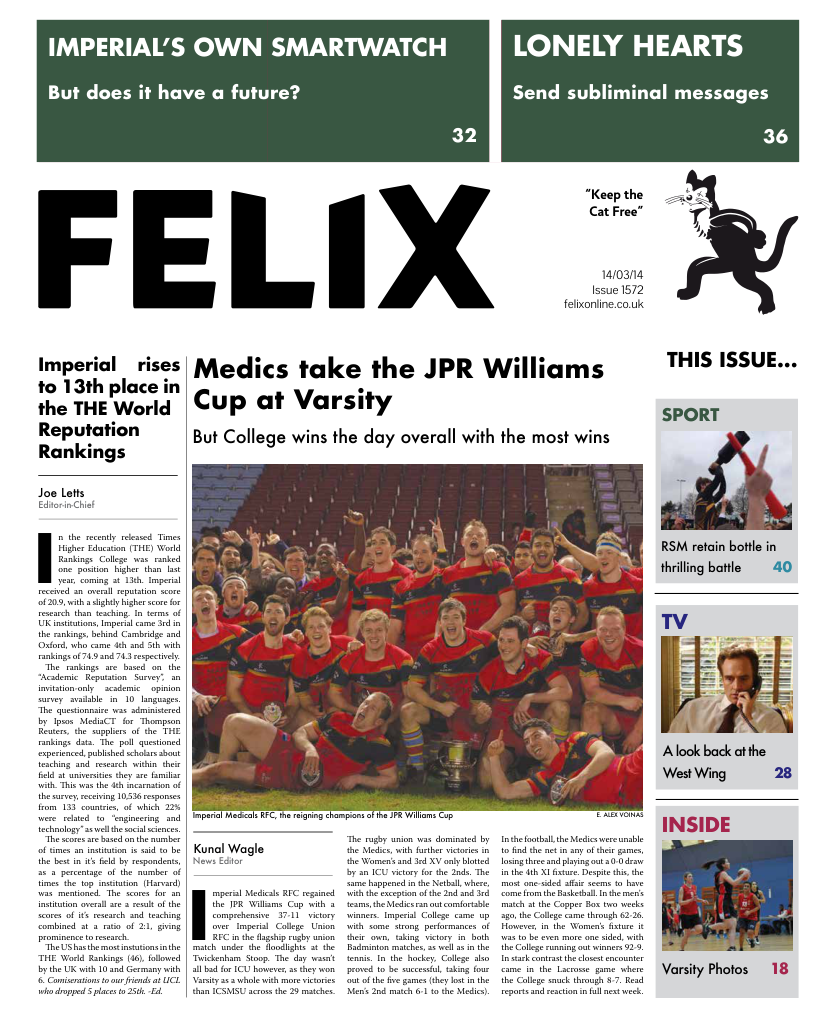Thoughts on the Imperial Elections
I must have manifestos on the brain because after three weeks writing about a certain famous Communist one, I turn to our own election manifestos. Voting has occasioned the re-emergence of some long dormant reflections, recounted here.
I must have manifestos on the brain because after three weeks writing about a certain famous Communist one, I turn to our own election manifestos. Voting has occasioned the re-emergence of some long dormant reflections, recounted here.
The first thing that struck me about the Manifestos is their comprehensive agreeableness. This is meant pejoratively. It is very hard to disagree or be offended by statements like ‘I want to make things better’ – in much the same way that you will probably agree with statements like ‘war isn’t very pleasant’ or ‘eating three kilograms of meat in a day is probably not good for your health’. However, if we are honest, these tell us very little. I do, only slightly reluctantly, recognise the value in ‘working to improve social events’ or ‘helping people out’, but telling me that in your Manifesto hardly allows me to differentiate you from rival candidates, and it certainly tells me very little about what you are actually planning to do.
Part and parcel of this are the personal biographies that often entered into the Manifestos. It is, I suppose, not completely irrelevant that the candidate has some appropriate experience or bureaucratic ability (because, as I read in one Manifesto, the candidate was German), but I would like to point out that the Manifestos are not, or at least in my view should not be, job cover letters. I may find it reassuring that your ten years involvement in the Union has allowed you to understand all the grimy Thick-of-It style dealings that must inevitably go on in such an important institution. But I am sorry if I find your experience alone utterly devoid of meaning if all you tell me is that because of this you can be trusted and that I, in my ignorance, should let you decide, not only how to ‘make things better’, but also what ‘making things better’ actually means. Finally, is it very wrong if I add that I care very little about the candidate as a person and am purely interested in ‘policy’ aims?
For fairness’ sake I should add that the situation was not as dire as I make out, having read several well thought out suggestions and proposals. However, I would argue that I am not incorrect in the essentials. I believe that these Manifestos, then, demonstrate two wider political trends which I personally find deeply disturbing. The first is the principle of consensus, the second the growth in the importance of experts. Taking the latter point first, is it just me that finds the widespread belief that ‘ordinary’ people cannot understand ‘important’ (and thus complex) issues such as, say, AV or better social nights, slightly patronising? We are, with good reason, very proud of our scientific prowess, and I admit it is not practical to have everyone studying the finer points of fractal geometry or stochastic processes, but a basic understanding of financial markets and the limitations of accompanying economic theory do not require this knowledge. Similarly, positions endorsed by respected experts have ranged from the ludicrous (Lynn Margulis’ conviction that HIV does not cause AIDs) to the sinister (the racial theories of the 1930s). I find it hard to believe that we as a generation are uniquely privileged in our ability to escape ideological and social conditions and that the experts should always be left to make decisions in lieu of the public.
As for consensus, there is no more popular word in political circles. What we need in politics, so they say, is consensus, widespread agreement based on respectful and reasoned debate where everybody gets a chance to present their case. That political disagreements are often a consequence of fundamental differences of principle seems to have been forgotten; as does the fact that if your principles change as a result of the kind of fair debate that is promoted (Question Time, say) you didn’t have much invested in your principles and were already a liberal anyway. We are told to forget these idiotic and tribal antagonisms of left- and right-wing politics and learn to do the right thing. That the proponents of Giddens’ ‘third way’ have all been right-wing never seems to have struck said proponents. To put it another way, to say that class-antagonism can be solved by dialogue is to have already changed it into something else. Remember this example, *****





